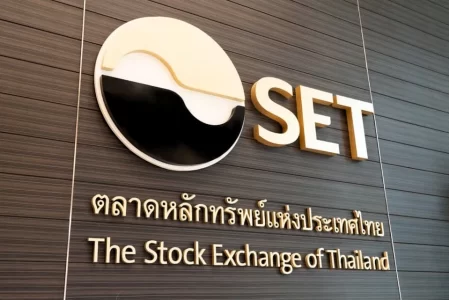Business
Thai Baht Hits a 7 Month Low Over Political Uncertainty in Thailand
On Monday, Thailand’s baht fell to a seven-month low as political instability hampered investor appetite, while most other developing Asian currencies fell against a stronger dollar after strong US data alleviated recession fears.
Equities in the region were mostly down, with shares in Seoul falling 0.8%, while those in the Philippines and China fell 0.3% and 0.5%, respectively.
The Thai baht fell 0.6% to its lowest level since November 30, 2022, as questions remain over whether the top candidate can receive enough votes to become prime minister in the new parliament’s first session next week.
“The (Move Forward) coalition is unlikely to have the necessary votes to form a new government,” said Alvin Tan, head of Asia FX strategy at RBC Capital Markets.

Tan noted that if Thailand does not form a new government by next week, the political deadlock and instability will continue.
The Bank of Thailand (BoT) announced that it will relax foreign exchange controls further in the second half of this year to promote capital outflows as the baht remains volatile. This year, the currency has lost 2.2%.
In other currency news, the South Korean won declined 0.3%, while the Philippines peso and Singapore dollar fell 0.2% and 0.1%, respectively.
In the United States, consumer confidence rose in June to its highest level in over a year and a half, showing that the economy remained on firm ground amid fears of a recession.
“All major data in the US definitely raises bets that the US Fed will hike interest rates again in July and that they will not cut interest rates quickly this year,” Tan added.
The Chinese yuan rose 0.04% after hints that the central bank is growing increasingly concerned about the currency’s recent decline.

According to TTB Bank analytics, low-yielding stocks, slow economic growth, and political uncertainty are three fragile fundamental factors that have discouraged investors from continuing to invest in the Thai stock market, resulting in net outflows of more than 100 billion baht of foreign funds in the first half of 2023.
The think tank of TMB Bank says the country’s stock market is entering a bear market, as evidenced by the index’s continuing slide to below the crucial resistance level of 1,500 points.
The Stock Exchange of Thailand (SET) index fell below 1,500 points, the lowest level since April 2021, while trading volume was low, at roughly 30-40 billion baht per day, compared to a high of 100 billion baht per day.
Furthermore, international investors continued to accrue net sells of more than 107 billion baht during the first half of this year, while ordinary investors, the majority of whom had net buys, saw a significant reduction in trading volume.
In the first six months, the number of active accounts declined steadily to only 980,000 every month, compared to as much as 1,300,000 when the market was thriving. According to TTB analytics, the drop was also influenced by global monetary policy tightening, which caused foreign funds to flee Thailand’s stock market.
“The phenomenon that foreign investors continue to have a net sell may not be just temporary, because Thailand’s fundamentals have become fragile over the past several years,” TTB analytics stated.
Three major elements influence investing and the baht
To begin with, share prices are high, trade is concentrated in specialised industries, and overall returns are poor.
Second, prior to the epidemic, the economy had begun to slow, resulting in a lack of incentive for stock investments. Finally, the protracted lack of political stability has harmed investor confidence.
Foreigners have been net sellers in the country’s stock market almost every year since 2013, including election years. Foreigners typically sold some of their equities in the run-up to an election, but then repurchased them after the votes closed.
This year’s election, however, was unique in that foreigners continued to sell more than 50 billion baht after the May 14 election. According to ttb analytics, this expressed concerns about political instability.
Political insecurity may result in a lack of consistency in policy implementation and harm foreign investors’ long-term confidence, as evidenced by a steady decline in foreign direct investment since 2013, causing Thailand to lag behind fellow Asean member states, particularly Vietnam and Indonesia.
Nonetheless, TTB Bank analytics believes the SET index has a chance to recover in the second half of this year because the new government’s economic stimulus programmes would assist restore confidence once the economy has recovered from shocks.
Business
PepsiCo Reduces Revenue Projections As North American Snacks And Key International Markets Underperform.

(VOR News) – In the third quarter of this year, Pepsi’s net income was $2.93 billion, which is equivalent to $2.13 per share. This was attributed to the company.
This is in stark contrast to net income of $3.09 billion, which is equivalent to $2.24 per share, during the same period in the previous year. The company’s earnings per share were $2.31 when expenses were excluded.
Net sales decreased by 0.6%, totaling $23.32 billion. Organic sales increased by 1.3% during the quarter when the effects of acquisitions, divestitures, and currency changes are excluded.
Pepsi’s beverage sales fell this quarter.
The most recent report indicates that the beverage and food sectors of the organization experienced a 2% decline in volume. Consumers of all income levels are demonstrating a change in their purchasing habits, as indicated by CEOs’ statements from the previous quarter.
Pepsi’s entire volume was adversely affected by the lackluster demand they encountered in North America. An increasing number of Americans are becoming more frugal, reducing the number of snacks they ingest, and reducing the number of times they purchase at convenience stores.
Furthermore, Laguarta observed that the increase in sales was partially attributed to the election that occurred in Mexico during the month of June.
The most significant decrease in volume was experienced by Quaker Foods North America, which was 13%. In December, the company announced its initial recall in response to a potential salmonella infection.
Due to the probability of an illness, the recall was extended in January. Pepsi officially closed a plant that was implicated in the recalls in June, despite the fact that manufacturing had already been halted.
Jamie Caulfield, the Chief Financial Officer of Pepsi and Laguarta, has indicated that the recalls are beginning to have a lessening effect.
Frito-Lay experienced a 1.5% decline in volume in North America. The company has been striving to improve the value it offers to consumers and the accessibility of its snack line, which includes SunChips, Cheetos, and Stacy’s pita chips, in the retail establishments where it is sold.
Despite the fact that the category as a whole has slowed down in comparison to the results of previous years, the level of activity within the division is progressively increasing.
Pepsi executives issued a statement in which they stated that “Salty and savory snacks have underperformed year-to-date after outperforming packaged food categories in previous years.”
Pepsi will spend more on Doritos and Tostitos in the fall and winter before football season.
The company is currently promoting incentive packets for Tostitos and Ruffles, which contain twenty percent more chips than the standard package.
Pepsi is expanding its product line in order to more effectively target individuals who are health-conscious. The business announced its intention to acquire Siete Foods for a total of $1.2 billion approximately one week ago. The restaurant serves Mexican-American cuisine, which is typically modified to meet the dietary needs of a diverse clientele.
The beverage segment of Pepsi in North America experienced a three percent decrease in volume. Despite the fact that the demand for energy drinks, such as Pepsi’s Rockstar, has decreased as a result of consumers visiting convenience stores, the sales of well-known brands such as Gatorade and Pepsi have seen an increase throughout the quarter.
Laguarta expressed his opinion to the analysts during the company’s conference call, asserting, “I am of the opinion that it is a component of the economic cycle that we are currently experiencing, and that it will reverse itself in the future, once consumers feel better.”
Additionally, it has been noted that the food and beverage markets of South Asia, the Middle East, Latin America, and Africa have experienced a decline in sales volume. The company cut its forecast for organic revenue for the entire year on Tuesday due to the business’s second consecutive quarter of lower-than-anticipated sales.
The company’s performance during the quarter was adversely affected by the Quaker Foods North America recalls, the decrease in demand in the United States, and the interruptions that occurred in specific international markets, as per the statements made by Chief Executive Officer Ramon Laguarta.
Pepsi has revised its forecast for organic sales in 2024, shifting from a 4% growth rate to a low single-digit growth rate. The company reiterated its expectation that the core constant currency profitability per share will increase by a minimum of 8% in comparison to the previous year.
The company’s shares declined by less than one percent during premarket trading. The following discrepancies between the company’s report and the projections of Wall Street were identified by LSEG in a survey of analysts:
SOURCE: CNBC
SEE ALSO:
Old National Bank And Infosys Broaden Their Strategic Partnership.
Business
Old National Bank And Infosys Broaden Their Strategic Partnership.

(VOR News) – Old National Bank, a commercial bank with its headquarters in the Midwest, and Infosys, a firm that specializes in information technology, have recently entered into a strategic expansion of their link, which has been in place for the past four years.
This expansion is more likely to take place sooner rather than later, with the likelihood being higher.
For the purpose of making it possible for Old National Bank to make use of the services, solutions, and platforms that are offered by Infosys, the objective of this expansion is to make it possible for the bank to transform its operations and processes through the application of automation and GenAI, as well as to change significant business areas.
This lets the bank leverage Infosys’ services, solutions, and platforms.
Old National Bank Chairman and CEO Jim Ryan said, “At Old National, we are committed to creating exceptional experiences for both our customers and our fellow employees.”
This statement is applicable to Old National Bank. Infosys is carefully managing the business process innovations that it is putting us through, putting a strong emphasis on efficiency and value growth throughout the process to ensure that it is carried out efficiently.
This is a routine occurrence throughout the entire operation. Because of Infosys’ dedication to our development and success, we are incredibly appreciative of the assistance they have provided.
Old National has been receiving assistance from Infosys in the process of updating its digital environment since the year 2020, according to the aforementioned company.
Ever since that time, the company has been providing assistance. The provision of this assistance has been accomplished through the utilization of a model that is not only powerful but also capable of functioning on its own power.
Infosys currently ranks Old National thirty-first out of the top thirty US banks.
This ranking is based on the fact that Old National is the nation’s largest banking corporation.
It is estimated that the total value of the company’s assets is approximately fifty-three billion dollars, while the assets that are currently being managed by the organization are valued at thirty billion dollars.
Dennis Gada, the Executive Vice President and Global Head of Banking and Financial Services, stated that “Old National Bank and Infosys possess a robust cultural and strategic alignment in the development, management, and enhancement of enterprise-scale solutions to transform the bank’s operations and facilitate growth.”
This remark referenced the exceptional cultural and strategic synergy between the two organizations. Dennis Gada is the one who asserted this claim. This was articulated explicitly concerning the exceptional cultural congruence and strategy alignment of the two organizations.
We are pleased to announce that the implementation of Infosys Topaz will substantially expedite the transformation of Old National Bank’s business processes and customer service protocols. We are exceedingly enthusiastic about this matter. We are quite thrilled about this specific component of the scenario.
Medium-sized banks operating regionally will continue to benefit from our substantial expertise in the sector, technology, and operations. This specific market segment of Infosys will persist in benefiting from our extensive experience. This phenomenon will enable this market sector to sustain substantial growth and efficiency benefits.
SOURCE: THBL
SEE ALSO:
American Water, The Largest Water Utility In US, Is Targeted By A Cyberattack
States Sue TikTok, Claiming Its Platform Is Addictive And Harms The Mental Health Of Children
Qantas Airways Apologizes After R-Rated Film Reportedly Airs On Every Screen During Flight
Business
American Water, The Largest Water Utility In US, Is Targeted By A Cyberattack

The largest regulated water and wastewater utility company in the United States stated Monday that it had been the target of a cyberattack, forcing the company to halt invoicing to consumers.
American Water, The Largest Water Utility In US, Is Targeted By A Cyberattack
American Water, based in New Jersey and serving over 14 million people in 14 states and 18 military facilities, said it learned of the unauthorized activity on Thursday and quickly took precautions, including shutting down certain systems. The business does not believe the attack had an impact on its facilities or operations and said employees were working “around the clock” to determine the origin and scale of the attack.

According to their website, American Water operates over 500 water and wastewater systems in around 1,700 communities across California, Georgia, Hawaii, Illinois, Indiana, Iowa, Kentucky, Maryland, Missouri, New Jersey, Pennsylvania, Tennessee, Virginia, and West Virginia.
SOURCE | AP
-

 News3 years ago
News3 years agoLet’s Know About Ultra High Net Worth Individual
-
Entertainment2 years ago
Mabelle Prior: The Voice of Hope, Resilience, and Diversity Inspiring Generations
-

 Health3 years ago
Health3 years agoHow Much Ivermectin Should You Take?
-

 Tech2 years ago
Tech2 years agoTop Forex Brokers of 2023: Reviews and Analysis for Successful Trading
-

 Lifestyles2 years ago
Lifestyles2 years agoAries Soulmate Signs
-

 Movies2 years ago
Movies2 years agoWhat Should I Do If Disney Plus Keeps Logging Me Out of TV?
-

 Health3 years ago
Health3 years agoCan I Buy Ivermectin Without A Prescription in the USA?
-

 Learning2 years ago
Learning2 years agoVirtual Numbers: What Are They For?

